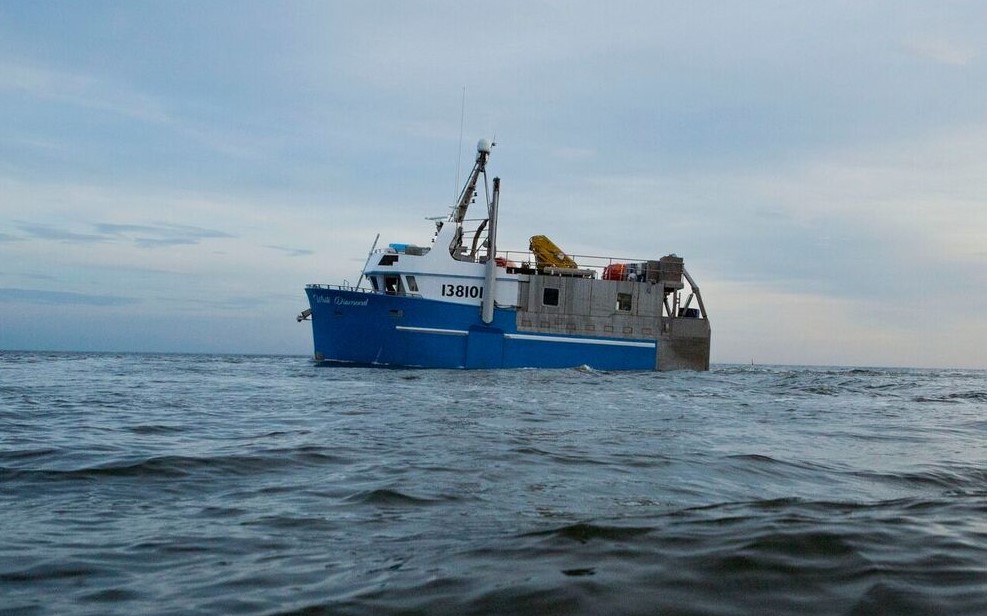
The William Kennedy, formerly the White Diamond
First research vessel dedicated to Hudson Bay will explore previously understudied Arctic regions
Canada’s first research vessel dedicated exclusively to historic Hudson Bay – a landmark for scientific research in Canada’s North – will leave port in Summerside, PEI this week to explore some of the most understudied regions of the Arctic. The William Kennedy is operated through an agreement between the Arctic Research Foundation, the same organization that discovered the HMS Terror, and the University of Manitoba under the umbrella of the Churchill Marine Observatory (funded by the Canada Foundation for Innovation, Province of Manitoba and Western Economic Diversification Canada).
Grappling with the effects of rapidly warming climate in the Arctic, scientists are struggling to collect baseline data to measure the impacts of climate change and to inform future predictions. The William Kennedy will bring together researchers and scientists, including oceanographers, geneticists and biologists, and work collaboratively with local communities to help in establishing these baselines.
Converted from an offshore crab fishing vessel, the William Kennedy has been retrofitted to handle extreme Arctic weather and ice conditions. The ship’s shallow draft, measuring just 12 feet, allows for critical research to be done in much shallower and near shore waters than traditional Arctic research vessels. The ship, which measures 66 feet in length, is equipped with both an interior drylab and wetlab and can accommodate up to 14 people beyond the crew.
“The size of the William Kennedy, the water it can access, and the type of research that can be done on it, has largely been missing from Arctic study,” explains C.J. Mundy, the principal investigator of the Southampton Island Marine Ecosystem Project (SIMEP). Mundy is leading one of the research groups on board for the maiden voyage and is environmental observatory chief scientist of the Churchill Marine Observatory, and associate professor at the U of M’s Centre for Earth Observation Science in the Clayton H. Riddell Faculty of Environment, Earth, and Resources.
Southampton Island, situated in northwest Hudson Bay, plays an integral role for Arctic marine mammals and to the livelihood of the Chesterfield Inlet, Naujaat and Coral Harbor Nunavut communities. SIMEP will gather data and obtain insights on the ecosystem’s past and present vulnerabilities to known climate shifts to help strengthen future predictions and add knowledge to help locals and stakeholders make decisions in the face of warming temperatures.
“The critical importance of marine ecosystems to local, territorial and federal governments as well as industry make it of the utmost importance to be able to predict vulnerabilities to climate-influenced pressures,” adds Mundy.
GENICE, a Genome Canada project in association with the University of Calgary, University of Manitoba, McGill University and the National Research Council Canada, will also be joining the expedition. Their research will investigate questions on how to respond to oil spills in the Arctic as well as to gain a deeper understanding of the microorganisms within the Arctic marine ecosystem.
The William Kennedy will travel through Hudson Bay with a final destination of the Port of Churchill, Manitoba.
About Arctic Research Foundation
Created in 2011 by co-founders Jim Balsillie and Tim Macdonald, Arctic Research Foundation (ARF) is a private, non-profit organization that supports scientific research, sustainable development and cultural preservation in Canada’s North. ARF works collaboratively with northern communities, governments, universities and partners to build capacity and provide the tools and connections to assist with research into the unknown regions of the North.
About the Churchill Marine Observatory
The Churchill Marine Observatory (CMO) will be a unique, highly innovative research facility located in Churchill, Manitoba, Canada’s only Arctic deep-water port. The CMO will directly address technological, scientific, and economic issues pertaining to Arctic marine transportation and oil and gas exploration and development throughout the Arctic. The William Kennedy is a part of the CMO’s Environmental Observatory (EO) system and serves as a state-of-the-art platform to conduct scientific research in Hudson Bay.
Research at the University of Manitoba is partially supported by funding from the Government of Canada Research Support Fund.






